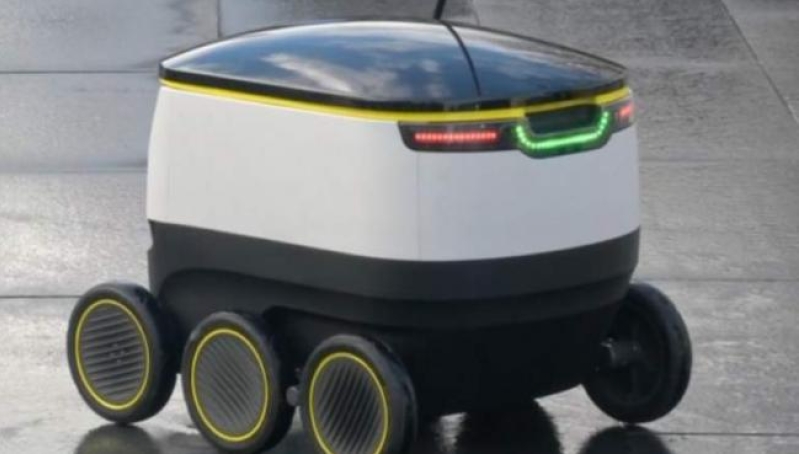
Fleets of small autonomous robots could soon become a familiar presence on public pathways with the advent of ground-based drones that aim to improve local delivery of goods and groceries.
Former Skype co-founders have launched a new company, Starship Technologies, which is preparing to test their self-driving delivery robots in London. The as yet unnamed robots are small, safe, practical and free from CO2 emissions, according to the developers. "When you place your order online, as you do right now, but instead of getting the delivery by somebody coming up to your door and knocking on your door, you would get it by a robot," said Ahti Heinla, a Skype co-founder and CEO at Starship Technologies.
The robots can carry the equivalent of two bags of shopping and complete local deliveries in between five and 30 minutes from a designated hub or retail outlet. Heinla explained that the robots are not designed for long-distance orders, but for completing the final mile of a delivery. He said this puts the customer in control of their deliveries by allowing them to choose from a selection of short, precise delivery slots.
"When you as a consumer, when you find it convenient for you, you call up the delivery using your smartphone.And then the robot gets loaded with your parcel in our hub and it drives to your doorstep. And that takes about 20 minutes. So instead of having a delivery window of half a day or something that you're getting your delivery sometime during today; you can pick a delivery window that is like ten minutes," said Heinla.
When a package is out for delivery with a robot, the customer can track it in real time on their smartphone. When it arrives at the delivery address, the customer uses their smartphone to unlock the secure compartment to access their goods.
In Greenwich, London, close to where the pilot schemes will take place, the 'droid drew a few puzzled looks but also a largely positive response from passers-by."I'm very impressed. It's small, it looks safe, looks futuristic. Very clever idea, I think," said Jake. "I think it's the thing of the future. In decades to come you're going to see these sorts of things buzzing around the streets or up in the air. It's the start of the way ahead, I think," said shopper Pete, who added the robots could save his bacon over the festive period: "For someone like me who leaves Christmas shopping until the last minute it would certainly be handy for getting it next day.
"Starship's technology uses 'off the shelf' components, with the robots lightweight and low-cost enabling the company to bring the current cost of delivery down by 10-15 times per shipment. Each delivery robot will be fitted with navigation and obstacle avoidance software, with the company saying the robots will drive autonomously 99 percent of the time.
But they are also overseen by human operators who can step in to ensure safety at all times. Any concern about theft of the robot's cargo can be allayed by the in-built security features that Heinla said makes the potential reward for a would-be robber not worth the risk.
"While you might think that some people would want to steal something from the robot, it's actually much harder than you would think. First, the parcel compartment is obviously locked. So it's not easy to break into the robot, especially if you don't have any special tools to do it. And most hooligans on the street, they don't have special tools. Secondly, the robot has nine cameras and it's constantly connected to the internet. It has GPS. There is an operator that can actually talk to people around the robot, there is a loudspeaker and microphone in the robot. So it's not that easy actually," explained Heinla.
Automated delivery services are being developed by a number of companies, including Google and Wal-Mart. Online retailer Amazon, whose unmanned aerial drones are looking to take flight in the near future, recently launched a video showing a prototype of their technology. Starship Technologies, however, say there are huge "social acceptance" problems with autonomous airborne drones; something their earthbound robots won't have.
"It's safer than a flying drone. People actually do not like low flying drones, especially when they are flying over their backyard and it's a buzzing, flying machine. If it's doing a delivery for you maybe it's okay, but of it's doing a delivery for somebody else, you know, people don't like that. People don't like other machines flying over their backyard where their children are playing. So there's huge social acceptance problems with the robots, with the robots that are flying. But not so much for the robots that are land-based, and safe, and look cute," said Heinla.
Starship Technologies will launch real-life trials of the robots in London and a couple of U.S. cities in Spring 2016.






